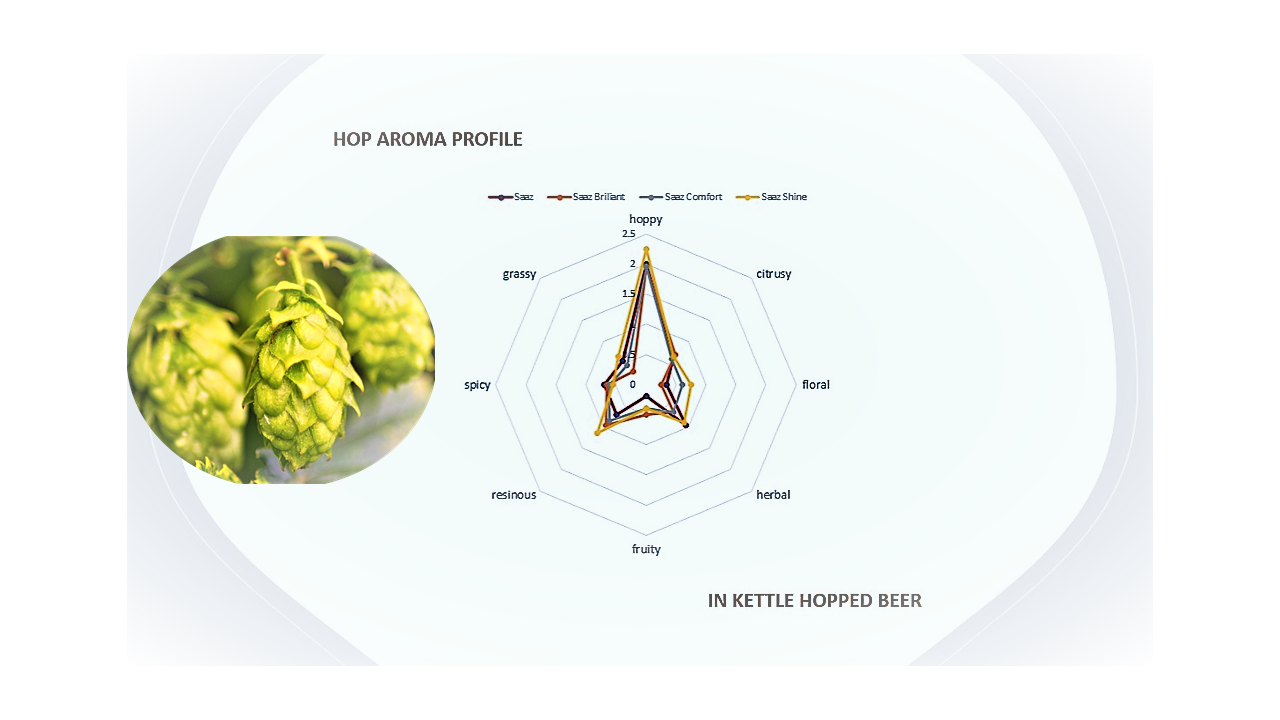Brewing tests of new fine aroma hop varieties (Humulus lupulus L.) Saaz Brilliant, Saaz Comfort and Saaz Shine
DOI:
https://doi.org/10.18832/kp2021.67.464Keywords:
hop varieties, beer, hop oils, sensory, kettle hopping, dry hopping, GC-MS-MSAbstract
Characterization of varietal profiles of hop secondary metabolites in beer is of considerable importance for hop growing and brewing. This three-year study focused on pilot brewing tests of three new Saaz derived hop varieties, namely Saaz Brilliant, Saaz Shine and Saaz Comfort. The sensory profiles of kettle and kettle+dry single hopped beers were monitored. At the same time, the impact of dry hopping technology on sensory perception of final beers and changes in volatile compounds was investigated. Pilot brews (200 l) of 12% pale lager were prepared in kettle and kettle+dry variants using the new Czech varieties and traditional Saaz as a control sample. Essential oils in beers were determined by GC/MS-MS method with the aim to clarify links to the beer sensory profile of both, kettle and dry hopping mode. The descriptive sensory method of hop-derived aromas and the triangle tests were employed to determine the sensory quality of beer. The overall sensory impression of beers from all tested varieties was at least comparable to traditional Saaz, and Saaz Comfort even reached better evaluation. The profile of essential oils and hop flavours in beer was partially different, however it was not rated worse than Saaz. The kettle+dry hopped beers of new varieties were significantly different from Saaz in the triangle test, Saaz Brilliant was preferred over the Saaz. The results showed considerable potential of new varieties for the production of interesting and taste-specific beers and the enrichment of the spectrum of fine aroma varieties of Czech hops.
References
Algazzali, V., Shellhammer, T. (2016). Bitterness Intensity of oxidized hop acids: Humuli-nones and hulupones. Journal of the American Society of Brewing Chemists, 74(1), 36–43. https://doi.org/10.1094/ASBCJ-2016-1130-01
Almaguer, C., Schönberger, C., Gastl, M., Arendt, E.K., Becker, T. (2014). Humulus lupulus: A story that begs to be told. A review. Journal of the Institute of Brewing, 120, 289–314. https://doi.org/10.1002/jib.160
Analytica EBC (2010). European Brewery Convention, Carl-Hans Verlag, Nürenberg, 2010. ISBN 978-3-418-00759-5
Commission (2008). Official Journal of the European Union, C016, 23/01/2008, 0014–0022.
Dresel, M., Vogt, C., Dunkel, A., Hofmann, T. (2016). The bitter chemodiversity of hops (Humulus lupulus L.). Journal of Agricultural and Food Chemistry, 64: 7789−7799. https://doi.org/10.1021/acs.jafc.6b03933
Dresel, M., Praet, T., Van Opstaele, F., Van Holle, A., Naudts, D., De Keukeleire, D., De Cooman, L., Aerts, G. (2015). Comparison of the analytical profiles of volatiles in single-hopped worts and beers as a function of the hop variety. Brewing Science, 68 (1/2), 8–28.
Dušek, M., Olšovská, J., Krofta, K., Jurková, M., Mikyška, A. (2014). Qualitative determination of β acids and their transformation products in beer and hop using HR/AM-LC-MS/MS. Journal of Agricultural and Food Chemistry, 62, 7690−7697. https://doi.org/10.1021/jf501852r
Forster, A., Gahr, A. (2013). On the fate of certain hop substances during dry hopping. Brewing Science, 66 (7/8), 93–103.
Fric, V. (1992). Odrůdová skladba a ozdravovací proces chmele v ČSFR (Varietal composition and healing process of hops in the CSFR), Chmelařství, 65, 85–86. Available only in Czech.
Fritsch, H.T., Schieberle, P. (2003). Changes in key aroma compounds during boiling of unhopped and hopped wort. Proceedings of the 29th Congress of European Brewery Convention, Dublin, 2003, Fachverlag Hans Carl, Nürnberg, Germany, CD-ROM.
Hanke, S., Schüll, F., Seigner, E., Engelhard, B., Lutz, A. (2015) Systematic brewing trials for evaluation and selection of new German hop breeding lines and future hop varieties. Proceedings of the 35th Congress of European Brewery Convention, Porto, 24–28 May 2015, 382–399. ISBN 9781510817104
Haslbeck, K., Bub, S., Schönberger, C., Zarnkow, M., Jacob, F., Coelhan, M. (2017). On the fate of β-myrcene during fermentation - The role of stripping and uptake of hop oil components by brewer's yeast in dry-hopped wort and beer. Brewing Science, 70 (11/12), 159–169. https://doi.org/10.23763/BrSc17-16haslbeck
He, Y., Dong, J., Yin. H., Zhao, Y., Chen, R., Wan, X., Chen, P., Hou, X., Liu, J., Chen L. (2014). Wort composition and its impact on the flavour-active higher alcohol and ester formation of beer: A review. Journal of the Institute of Brewing, 120, 157–163. https://doi.org/10.1002/jib.145
Inui, T., Tsuchiya, F., Ishimaru, M., Oka, K., Komura, H. (2013). Different beers with different hops. Relevant compounds for their aroma characteristics. Journal of Agricultural and Food Chemistry, 61, 4758−4764. https://doi.org/10.1021/jf3053737
Jaskula, B., Aerts, G., De Cooman, L. (2010). Hop α-acids isomerization and utilization: An experimental review. Cerevisia, 35, 57–70. https://doi.org/10.1016/j.cervis.2010.09.004
Kageyama, N., Inui, T., Fukami, H., Komura, H. (2011). Elucidation of chemical structures of the components responsible to beer aftertaste. Journal of the American Society of Brewing Chemists, 69, 255–259. https://doi.org/10.1094/ASBCJ-2011-0901-01
Kaltner, D., Mitter, W. (2009). Changes in hop derived compounds during beer production and ageing. In: Shellhammer, T.H. (Ed.) Hop Flavour and Aroma. Proceedings of the 1st International Brewers Symposium, Master Brewers Association of the Americas, St. Paul, Minnesota, 37–6. ISBN 9780977051984
Kishimoto, T., Wanikawa, A., Kono, K., Shibata, K. (2006). Comparison of the odor-active compounds in unhopped beer and beers hopped with different hop varieties. Journal of Agricultural and Food Chemistry, 54, 8855–8861. https://doi.org/10.1021/jf061342c
Krofta, K., Hervert, J., Mikyška, A., Dušek, M. (2019). Hop beta acids - from cones to beer. Acta Horticulturae, 1236, 15–22. https://doi.org/10.17660/ActaHortic.2019.1236.3
Krofta, K., Patzak, J., Nesvadba, V., Mikyška, A., Slabý, M., Čejka, P. (2013). Vital - The Czech hop hybrid variety. Kvasný průmysl, 59(1), 13–17. https://doi.org/10.18832/kp2013001
Krofta, K., Nesvadba, V., Čepička, J., Mikyška, A. (2002). Agnus - první česká vysokoobsažná odrůda chmele. (Agnus-First Czech High-alpha Hop Variety). Kvasny prumysl, 48(9), 239–244. https://doi.org/10.18832/kp2002018
McLaughlin, I.R., Lederer, C., Shellhammer, T.H. (2008). Bitterness-modifying properties of hop polyphenols extracted from spent hop material. Journal of the American Society of Brewing Chemists, 66(3), 174–183. https://doi.org/10.1094/ASBCJ-2008-0619-01
Mikyška, A., Olšovská, J., Slabý, M., Štěrba, K., Čerenak, A., Košir, I. J., Pavlovič, M., Kolenc, Z., Krofta K. (2018). Analytical and sensory profiles of Slovenian and Czech hop genotypes in single hopped beers. Journal of The Institute of Brewing, 124(3), 209–221. https://doi.org/10.1002/jib.494
Mitter, W., Biendl, M., Kaltner, D. (2001). Behavior of hop-derived aroma substances during wort boiling. Proc. EBC Symposium on Flavour and Flavour Stability (EBC Monograph 31), 2001, Nancy, France; Fachverlag Hans Carl, Nürnberg, Germany. ISBN: 978-3-418-00788-5
Nesvadba, V., Brynda, M., Henychová, A., Ježek, J., Kořen, J., Krofta, K., Malířová, I., Patzak ,J., Polončíková, Z., Svoboda, P., Valeš, V., Vostřel, J. (2013). Development and tradition of Czech hop varieties. Chmelařský institut s.r.o. Žatec. ISBN 78-80-87357-11-8.
Nesvadba, V., Charvátová, J (2020). New fine aroma varieties of hops (Humulus lupulus L.) Saaz Brilliant, Saaz Comfort, Saaz Shine and Mimosa. Kvasný průmysl, 66(4), 320–330. https://doi.org/10.18832/kp2019.66.320
Nesvadba, V., Charvátová, J. (2020a). Nové odrůdy chmele registrované v roce 2019 (New hop varieties registered in 2019). Proceedings of lectures and papers from the seminar Hop Agrotechnics, Žatec 20 February 2020, 163–171. ISBN 978-80-86836-40-9
Nesvadba, V., Charvatova, J., Stefanova, L. (2017a). Hop breeding in the Czech Republic. In: Weihrauch, F. (Ed.) Proceedings of the Scientific-Technical Commission 25–29 June 2017, St. Stefan am Walde, Austria. Wolnzach: Scientific-Technical Commission of the International Hop Growers' Convention, 7–10.
Nesvadba, V., Charvatova J., Stefanova, L. (2017b). New varieties and perspective genotypes of hops. Kvasný průmysl, 63(5), 237–240. https://doi.org/10.18832/kp201724
Nesvadba, V., Charvátová J., Štefanová L. (2018). Využívání genetických zdrojů chmele ve šlechtění (Use of genetic resources of hops in breeding). Chmelařství, 91(4–5), 57–60. Available only in Czech
Oladokun, O., Smart, K., Hort, J., and Cook, D. (2015). Impact of hop bitter acids and polyphenolic profiles on the perceived bitterness of beer. Proceedings of the 35th Congress of European Brewery Convention, Porto, 24-28 May 2015, 538-549. ISBN 9781510817104
Praet, T., Van Opstaele, F., De Causmaecker, B., Aerts, G., De Cooman, L. (2016). Heat-induced changes in the composition of varietal hop essential oils via wort boiling on a laboratory scale. Journal of American Society of Brewing Chemists, 74(3), 212–223. https://doi.org/10.1094/ASBCJ-2016-3257-01
Praet, T., Van Opstaele, F., Jaskula-Goiris, B., Aerts, G., De Cooman, L. (2012). Biotransformations of hop-derived aroma compounds by Saccharomyces cerevisiae upon fermentation. Cerevisia, 36, 125–132. https://doi.org/10.1016/j.cervis.2011.12.005
Rígr, A., Beránek, F., Nesvadba, V. (1997). Phenotype variability of the main characteristics of hop varieties as a source for hop hybridisation process. Rostlinná výroba, 43(7), 315–318. Available only in Czech.
Takoi, K., Itoga, Y., Koie, K., Takayanagi, J., Kaneko, T., Watanabe, T., Matsumoto, I., Nomu-ra, M. (2017). Systematic analysis of behaviour of hop-derived monoterpene alcohols during fermentation and new classification of geraniol-rich flavour hops. Brewing Science, 70(11/12), 177–186. https://doi.org/10.23763/BrSc17-17takoi

Downloads
Published
How to Cite
Issue
Section
License
Copyright (c) 2021 Alexandr Mikyška, Karel Štěrba, Martin Slabý, Vladimír Nesvadba, Jitka Charvátová

This work is licensed under a Creative Commons Attribution 4.0 International License.







